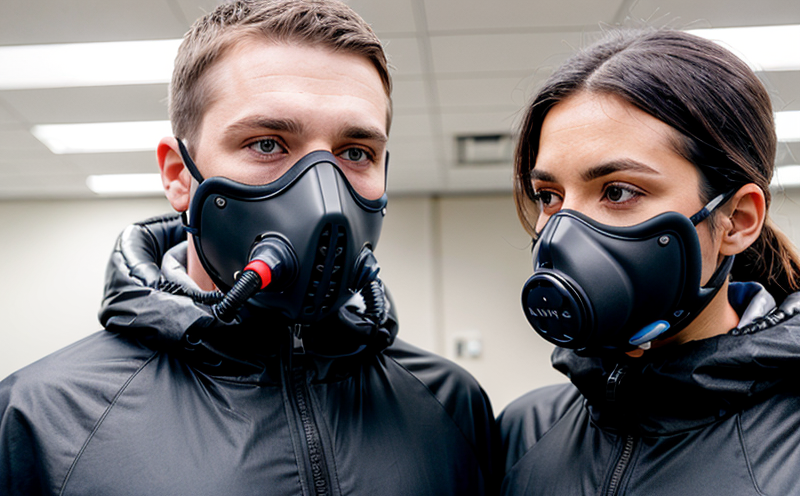NIOSH 42 CFR 84 Biocompatibility Testing
The National Institute for Occupational Safety and Health (NIOSH), under Title 42, Code of Federal Regulations, Part 84 (42 CFR 84), establishes strict requirements for the testing and certification of respiratory protective equipment. One critical aspect of this regulation is biocompatibility testing, which ensures that respirators are safe for extended use by workers without causing adverse health effects.
The biocompatibility test assesses whether a respirator material or component can come into prolonged contact with human skin or mucous membranes without causing irritation, allergic reactions, or other harmful effects. This is essential as respiratory protective equipment may be worn for long periods in various industrial settings where workers are exposed to hazardous environments.
The testing process typically involves placing a sample of the respirator material in direct contact with human skin under controlled conditions. The test subjects are observed for any signs of irritation, allergic reactions, or other adverse effects over a specified period. If no such effects are observed, the material is deemed biocompatible and suitable for use.
The importance of this testing cannot be overstated in sectors like mining, oil and gas exploration, construction, and healthcare, where workers may wear respirators for extended periods. Ensuring that these devices do not cause harm to the user can significantly enhance occupational safety and protect worker health.
- Materials Tested: Respirator masks, cartridges, filters, and other components that come into contact with skin or mucous membranes during use.
- Testing Environment: Controlled conditions simulating real-world usage scenarios to ensure accurate assessment of biocompatibility.
The results of this testing are critical for manufacturers, as they provide assurance that their products meet regulatory standards and can be safely used by workers. For quality managers and compliance officers, ensuring that respirators comply with these stringent requirements is crucial for maintaining a safe work environment. R&D engineers benefit from knowing the exact parameters to which their prototypes must adhere, while procurement teams need to ensure that only biocompatible materials are sourced.
The process of NIOSH 42 CFR 84 biocompatibility testing is not just about compliance; it's also about protecting the health and safety of workers. By adhering to these standards, manufacturers can build trust with their customers and ensure that their products meet or exceed industry expectations.
Biocompatibility testing plays a vital role in ensuring the safety of respirators used in various industries. It is a critical step in the development and certification process for respiratory protective equipment. By adhering to these stringent standards, manufacturers can produce safer, more reliable products that contribute to a healthier work environment.
Benefits
The benefits of NIOSH 42 CFR 84 biocompatibility testing are numerous and far-reaching. For manufacturers, it ensures compliance with federal regulations, which is essential for the safe production and marketing of respirators. Compliance officers can rest assured that their products meet stringent safety standards, thereby reducing legal risks associated with non-compliance.
For quality managers, this testing provides a reliable method to ensure product consistency and reliability. R&D engineers gain valuable insights into material properties and potential improvements for future designs. Procurement teams benefit from knowing which suppliers are capable of delivering biocompatible materials consistently.
From an occupational safety perspective, the benefits are substantial. Workers in high-risk environments can trust that their respirators will not cause adverse health effects, enhancing overall worker well-being and productivity. The reduction in healthcare costs associated with work-related respiratory issues is a significant financial advantage for employers. Additionally, meeting these standards can enhance the company's reputation as an industry leader in occupational safety.
For end-users, biocompatibility ensures that they are not exposed to harmful substances when wearing respirators. This peace of mind translates into higher job satisfaction and increased trust in their employer’s commitment to worker health and safety.
International Acceptance and Recognition
- United States: NIOSH biocompatibility testing is mandated by the Occupational Safety and Health Administration (OSHA) for respirator certification under 42 CFR Part 84.
- European Union: While not a direct equivalent, CE marking for respiratory protective equipment includes checks that align with biocompatibility principles as outlined in EU directives.
- Australia and New Zealand: The Australian Standard AS/NZS 1716:2012 incorporates similar biocompatibility criteria to protect workers' health during prolonged respirator use.
The acceptance of NIOSH standards in the global market is a testament to their rigor and effectiveness. Manufacturers who comply with these tests can expand their product range, targeting international markets without additional regulatory hurdles. This recognition fosters a competitive advantage by ensuring that products meet or exceed global safety standards.
Competitive Advantage and Market Impact
The ability to offer respirators that comply with NIOSH 42 CFR 84 biocompatibility testing can significantly enhance a company's market position. In highly regulated industries, compliance with these standards is not only a legal requirement but also a competitive differentiator. It signals to customers and investors that the company prioritizes occupational safety and adheres to the highest quality standards.
For manufacturers, this compliance can lead to increased sales as it builds trust among buyers who prioritize worker health and safety. In the global market, it opens doors to international markets where regulatory requirements may be stringent but flexible enough to accept NIOSH-certified products. This recognition also enhances brand reputation, leading to higher customer loyalty and repeat business.
The impact on competitive advantage is profound in sectors like healthcare, oil and gas, mining, and construction, where respiratory protection is crucial for worker safety. By ensuring that their respirators meet the stringent biocompatibility requirements, manufacturers can differentiate themselves from competitors who may not adhere to these standards.





